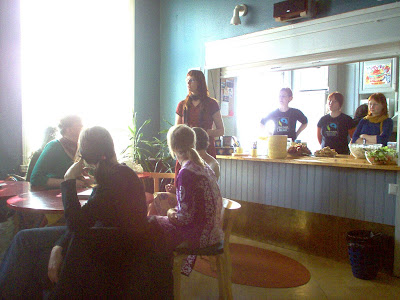When I was told by Ville Suomi that we would have two visitors from the Palam Rural Centre in India, I believed that they were from New Delhi, assuming Palam to be related to the Palam Airport.

However, when I went to the chappal making demo on Tuesday noon, I saw a humble "moochi" sitting on the floor making a sandal using his traditional skills.
Daniel Jesudasan, and his boss Benjamin Sundarkumar, are from Tirupur in Tamilnadu.
The real name of the organisation should be Paalam. Paalam mean "bridge" in both Tamil and Malayalam.
Tirupur is the major textile centre of India producing undergarments and t-Shirts by the millions and these can be found in even the most exclusive of shops around the world.
Daniel is a humble cobbler, having learnt the profession from his uncle over 30 years ago. In the period since, he estimated that he has made over 50000 sandals plus a variety of different products as leather bags, key ring holders, and many other leather products. His wife and his children have also been part of his professional activity.

Benjamin Sundarkumar is the Secretary of the Paalam Rural Centre, which is a cooperative of around 130 families, who are working to create an honest and good life for themselves and their children. They are producing leather products and also about 30 different fragrant soaps at their facility. They now intend to diversify into liquid soaps and shampoos.
Over the last 30 years the cooperative, started by a Swedish pastor, has taken legs of its own and has become part of the Fair Trade worldwide programme. (After Oulu, Daniel and Benjamin were on their way to Sweden so see this 80 year old pastor, now living in retirement in Stockholm.)

In an evening programme at the WALDA Youth Centre, Benjamin said that the prices they received from the Fair Trade programme was certainly "fair" and had helped the cooperative to develop itself. The small profit had been wisely invested in improving the livelihood of the families that form the cooperative.
Impressive was the Primary School which was equipped with computers and which they hope, with further improvement in profits and help from a few friends, that they can develop into a High School.

On Thursday, I took the two of them for a tour of the city of Oulu, showing them the Oulu University Central Hospital, the Medipolis area, the Technopolis area, the University of Oulu including the fascinating Botanical Gardens and the Zoological Museum, and then a trip to the Oulu Nallikari Beach including a visit to our friends at the Children's Park.





After this I took them home to meet Annikki and view the Kampitie garden, which today is a splendour bathed in much colour.
We had a delicious Indian meal at the Indian Cuisine Restaurant. Then, I dropped them off at Juuttiputiikki, where Daniel was once again going to demonstrate his artisan skills to a much larger audience than on Tuesday.
During our conversations, many serious thoughts struck me.
Firstly, with the children of the now cooperative members being educated presently in modern facilities, it is most likely that the artisan skills of Daniel and his friends will not be passed on to the next generation to follow. It is, therefore, imperative to develop their cooperative in a manner that does not drive these educated children away from their roots and homes as they are forced to seek employment in the metropolitan cities.
Secondly, I felt that as water is a scarce resource in Tirupur, when making their liquid soaps for export, it would be far wiser for them to export the liquid soapconcentrates, and market these concentrates in the Fair Trade outlets, just as Juuttiputiikki is doing of products from many other producers of liquid soaps and shampoos.
Thirdly, the cooperative should cooperate with Universities and other organisations to ensure that the water scarcity which plagues their region is solved using modern scientific methods. Otherwise the entire region, which today depends on fast depleting groundwater, will be led to total ruination!
And finally, the manufacturing facilities are truly primitive, but yet they produce a great range of products suitable for the elite of the western world. Here, I am caught in a dilemma as to what to say. If I say that the facilities should be modernised, it will take away the glamour of the humble way of life of these people. But if they do not modernise, their competivity will be lost and they could grind to a halt in the not too distant future.
The primitivity is what impresses me, YET depresses me. To think that India, with its explosion on the world economy, still has such manufacturing primitivity is extremely hard for me to accept.
Having spent many years with Annikki in villages around Karnataka - I know this is a reality. Maybe someone will help me clarify my thinking!



No comments:
Post a Comment